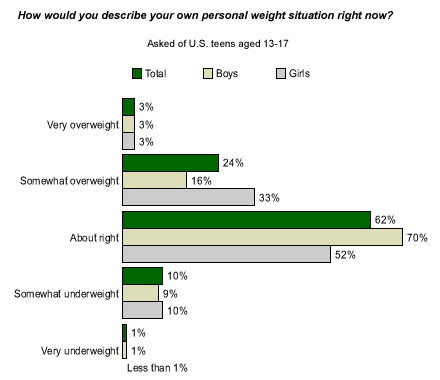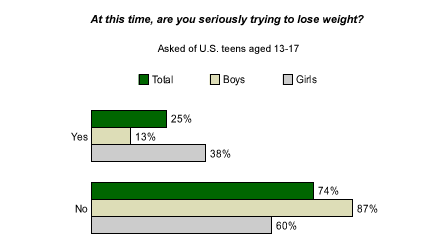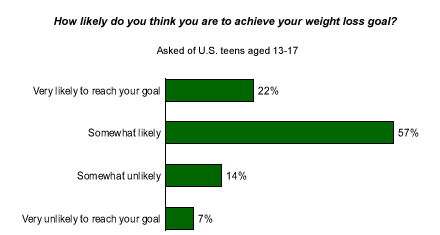In an ideal world, all teens could describe their eating habits the way one 17-year-old girl did in the most recent Gallup Youth Survey*: "I eat a very healthy and balanced diet, and watch fat, calcium, and calorie intakes. I also take various vitamins as well, to keep my immune system working well."
Unfortunately, we don't live in an ideal world. Over the past few decades, according to statistics from the Centers for Disease Control and Prevention, the number of overweight U.S. teens between the ages of 12 and 19 has nearly tripled, from 6.1% between 1971 and 1974 to 15.5% between 1999 and 2000. In addition, the United States has more overweight teens than 14 other developed nations, according to a study recently published in the Archives of Pediatrics and Adolescent Medicine.
Gallup recently asked teens (aged 13 to 17) several questions about their weight and their ability to control it. Overall, 27% say they are "very" or "somewhat" overweight, 62% think their weight is "about right," and 11% think they are "very" or "somewhat" underweight.
Girls tend to be more likely than boys to see themselves as having weight problems: 36% of girls say they are overweight, versus 19% of boys. Boys are more likely than girls to say their weight is about right -- 70% of boys think their weight is about right, compared with 52% of girls.

One in four teens (25%) say they are seriously trying to lose weight. That includes 38% of girls and 13% of boys.

The data show that 16- and 17-year-olds are somewhat more likely than 13- to-15 year-olds to describe themselves as overweight. So, it makes sense that older teens are somewhat more likely to say they are seriously trying to lose weight than younger ones are. Thirty-two percent of older teens say they are seriously trying to lose weight, compared with 21% of younger teens. But the fact that one in five younger teens is trying to lose weight is further indication that struggles with weight control can begin at an early age.
What Are Teens Doing to Lose Weight?
In the brave new world of carbs versus fats, revised food pyramids, and attention to blood sugar levels, it may seem that everyone is on a diet. When teens who said they are trying to lose weight were asked specifically what they are doing, 50% say they are dieting, and 33% say they are exercising. In their open-ended responses to this question, teens mentioned diet plans like Atkins, Weight Watchers, Slim-Fast, Subway, and others. Even many who do not mention a specific diet refer to a definite eating plan -- one 17-year-old girl, for example, mentioned "changing my diet to reduce the intake of processed sugars and wheats."
Fortunately, most teens have a sensible attitude toward trying to lose weight and many responses are in the "eat less, move more" category. One 14-year-old girl put it this way: "Be as active as possible, not eat over my capacity, and eat small amounts every few hours to keep my metabolism going." The roles parents play in providing a good diet is reflected in a 15-year-old boy's comment that he's trying to lose weight by doing sit-ups and "watching what I eat other than the food Mom makes for meals."
Confidence in Ability to Lose Weight
Twenty-two percent of teens who are trying to lose weight say they are "very likely" to reach their weight loss goal. An additional 57% say it is somewhat likely they will succeed. About one in five teens trying to shed pounds believe it is unlikely they will be able to lose the weight they want to. One can only hope that parents, teachers, and doctors are cautioning teens about weight-related diseases that may lie ahead -- type 2 diabetes, stroke, and heart disease, among others.

Bottom Line
In the same survey, Gallup asked teens what they think is the most urgent health problem facing people their age. Obesity ranks among the top health problems, along with AIDS and cancer. Clearly, many teens are beginning to understand the consequences of being overweight at such a young age.
*The Gallup Youth Survey is conducted via an Internet methodology provided by Knowledge Networks, using an online research panel that is designed to be representative of the entire U.S. population. The current questionnaire was completed by 785 respondents, aged 13 to 17, between Jan. 22 and March 9, 2004. For results based on the total sample, one can say with 95% confidence that the maximum margin of sampling error is ±4 percentage points.